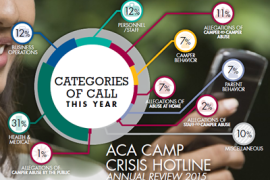Camps will need to adhere to a new Occupational Safety and Health Administration (OSHA) rule that will impact when and how they file their annual reports with OSHA. Please see below to learn why OSHA is taking this action, what the new rule requires, and how camps need to submit their OSHA reports. Also, please make sure you note the new OSHA filing dates for 2018 and for future years.
Why Is OSHA Issuing This Rule?
This simple change in the OSHA’s rulemaking requirements is an attempt to improve safety for workers across the country. According to OSHA, more attention to safety will save the lives and limbs of many workers and ultimately will help the employer’s bottom line. Finally, this regulation will improve the accuracy of this data by ensuring that camp workers will not fear retaliation for reporting injuries or illnesses.
What Does the Rule Require?
The new rule requires certain employers in high-risk industries, including residential camps, to electronically submit injury and illness data. OSHA has stated that analysis of this data will enable OSHA to use its enforcement and compliance assistance resources more efficiently. OSHA believes that public disclosure will encourage camp employers to improve workplace safety and provide valuable information to workers, job seekers, customers, researchers, and the general public. The amount of data submitted will vary depending on the size of company.
How Will Electronic Submission Work?
OSHA has provided a secure website that offers three options for data submission. First, users are able to manually enter data into a web form. Second, users are able to upload a CSV file to process single or multiple establishments at the same time. Third, users of automated record-keeping systems will have the ability to transmit data electronically via an API (application programming interface). The Injury Tracking Application (ITA) is accessible from the ITA launch page, (www.osha.gov/injuryreporting/index.html), where you are able to provide your 2017 OSHA Form 300A information. The date by which camp employers are required to submit to OSHA the information from their completed 2017 Form 300A is July 1, 2018.
OSHA is not accepting Form 300 and 301 information at this time. OSHA announced that it will issue a notice of proposed rulemaking (NPRM) to reconsider, revise, or remove provisions of the “Improve Tracking of Workplace Injuries and Illnesses” final rule, including the collection of the Forms 300/301 data. The Agency is currently drafting that NPRM and will seek comment on those provisions.
Anti-retaliation Protections
The rule also prohibits employers from discouraging workers from reporting an injury or illness. The final rule requires employers to inform employees of their right to report work-related injuries and illnesses free from retaliation, which can be satisfied by posting the already-required OSHA workplace poster. It also clarifies the existing implicit requirement that an employer’s procedure for reporting work-related injuries and illnesses must be reasonable and not deter or discourage employees from reporting; and incorporates the existing statutory prohibition on retaliating against employees for reporting work-related injuries or illnesses.
250 |
20–249 |
| Camps with 250 or more employees are only required to provide their 2017 Form 300A summary data. | Establishments with 20–249 employees in high-risk industries, including residential camps, must submit information from their 2017 Form 300A by July 1, 2018. Beginning in 2019 and every year thereafter, the information must be submitted by March 2. |
Source: Occupational Safety and Health Administration, US Department of Labor
Ralph Forsht is the new government relations consultant for the American Camp Association (ACA). Forsht oversees ACA’s work on federal public policy. For nearly 20 years, Forsht has been a dedicated advocate for children and families. Previously, Forsht served as senior vice president at First Focus Campaign for Children, a bipartisan children’s advocacy organization. At First Focus Campaign for Children, Forsht worked on federal family tax provisions, children’s healthcare and child poverty. Forsht was also a senior vice president at America’s Promise, a national nonprofit dedicated to helping children and communities. At America’s Promise, Forsht led the team of advocates championing public policy priorities at the federal, state and local levels. Forsht began his career on the staff the US Senate Budget Committee.
Ralph Forsht contact info: [email protected] | 703.944.2739
Photo courtesy of URJ Henry S. Jacobs Camp, Utica, MS


